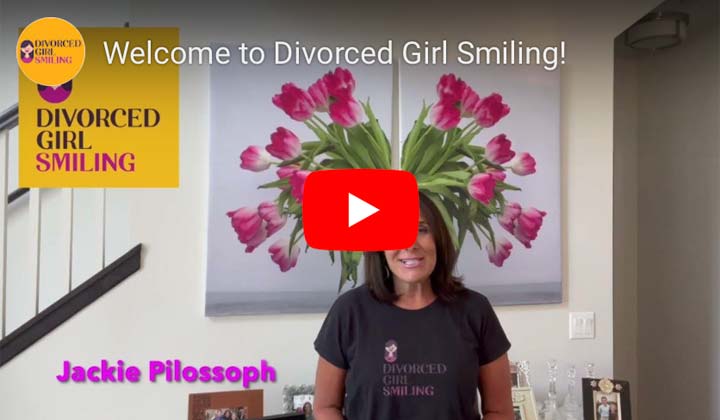[ad_1]
When it comes to money and divorce, I’ll say this: a divorce costs money. A lot of money. Not just for the divorce process itself, but now you’re talking two homes, two sets of bills for everything, two sets of everything for everything! Because expenses basically double, and because there’s so much stress and insecurity around money and divorce, people of all economic brackets during and after divorce tend to say these four AWFUL words that I wouldn’t wish on anyone:
I CAN’T AFFORD IT.
If you’re reading this and nodding your head, thinking, ‘Yes, I say this a lot more than I used to,’ I understand. I was there. Am there. But I want to tell you something that might make you feel better: you’re not alone. No one can afford it. No one can afford it whether they’re married, single, widowed or divorced, and no matter how little or how much money a person has.
No one can afford it because affording something is most oftentimes a choice.
A personal situation spawned this article. So, I haven’t been out of the country since I was 21 years old. One exception, last winter I went on a cruise with my mom and her two cousins and we stopped in the Bahamas, Puerto Rico and the Dominican Republic, each for a few hours. My mom paid for the trip. But the reason I’ve never traveled abroad is because one, I was a single mom and never wanted to be that far away from my kids, and two, I would always say, “I can’t afford it.”
I’m not sure what possessed me to do what I’m about to do, but I am headed to a remote Greek Island in about a month for a 10 day retreat with a group of women. I committed to the trip as if I was on autopilot. Something just seemed very right and I felt compelled to go. Guess what? I can’t afford it. That was my first instinct when I found out how much it costs. But I’m going. I found the money somehow because I chose to afford it.
Before I continue about why you should never again say the words, “I can’t afford it,” I want to be clear and talk about when you most likely can’t afford something like an expensive trip:
1. If you cannot pay your mortgage or rent.
2. If you don’t have enough food.
3. If you are struggling to pay bills.
4. If you are forgoing health care because you can’t afford it.
5. If you don’t have enough to support your kids.
I am someone who has lived in many financial brackets. I’ve been wealthy, where I didn’t really look at price tags, I’ve been close to having to ask my family for money because I was running out of money (that was right before I went back to work full time), I’ve been comfortable, cautious, frugal, spend-thrifty, penny-wise, and more! I have to say, in all of those situations, I’ve said the words “I can’t afford it,” and wish I wouldn’t have in many cases.
First things first. Just because yougot divorced, and you had to spend a ton of money on lawyers and now your living expenses have basically doubled, it doesn’t mean that you aren’t allowed to enjoy life, which could mean: buying yourself things, traveling, etc.
If you feel guilty about it, don’t. Guilt is a total waste of an emotion, it’s unproductive, and all it does is cause stress and self-loathing. Now, am I saying that you can shop at Nieman’s every week and buy $2000 dresses and shoes? No. Am I saying you should plan a trip to the Amalfi Coast because you’re bored? No.
But, if you are wise enough to take my advice, which is: meet with a financial advisor to work on a budget with you, to help you plan for your future, and to help you become empowered about your finances, then I guarantee you will not be saying those awful words, “I can’t afford it” any longer.
I would highly recommend the DGS trusted professionals who are financial advisors:
1. Elaine Moss and Peter Mullins.
2. Joanne Litman.
3. Amanda Campbell.
4. Craig Richman.
I’m not a financial advisor, but I do have a few tips to help you stop saying “I can’t afford it” and have a happier, healthier mindset when it comes to money.
1. Stop feeling guilty.
Not only should you not feel guilty because you are divorced, but on the flipside, you should feel like you deserve to spend money on yourself because you are divorced. The life of a divorced person is hard, especially at the beginning. Buying something you want or spending money on a trip is meant to bring you joy. You deserve joy! Give yourself a break!
2. Ask yourself if you really want it, why you want it, and what it means to you, and wait a few days before making the decision.
I have this policy that has worked for me for years. If I see something I want, whether that’s jewelry or clothing or furniture, I always sleep on it. Forget the salesperson’s pressure. Sleep on it. If I wake up the next day and I feel sick that I didn’t buy it, I ether go back (or call back and order it.) Same thing with business decisions. For the Greece trip, I waited about a week, and during those 7 days, I seriously couldn’t concentrate on anything but signing up.
3. If you want something big—a second home, a boat, an extravagant vacation, plastic surgery, talk to your financial advisor and ask if you can afford it.
I cannot count the number of times I have called Pete and Elaine and asked them, “Can I afford this?” This included me moving out of my house after 17 years to buy something a little nicer. I also had conversations with them about buying a life insurance policy, sending my two kids to college, and more. Your financial advisor will go through all of your accounts-not just the ones they manage, and you will have a conversation about it. Then they will revise your plan taking that money out of it and you can see how it will affect your future.
4. Reward yourself.
You work hard! Whether that’s at a job, or your business, or as a stay-at-home mom, or all three!! If you reward yourself with something you really want, it will motivate you to keep working hard. You will be happier and have gratitude for the thing you bought. I so often talk about the importance of non-material things in life in my articles, and I still feel that way, but material things are here for us to enjoy, too! You deserve them if you want them.
5. Be creative about where to find money for something you really want.
The best example I can give is let’s say your money is all tied up. You’re not liquid, and you need money for a vacation or for a facelift or for your child’s Bar or Bat Mitzvah. Make sure you share with your financial advisor all the accounts you have-not just the ones they manage. This can include life insurance policies, your mortgage, other loans, and more. You would be surprised at how shifting some things around can change “I can’t afford it” to cash.
6. While it’s important to have savings for an emergency, and for when you are older, remember not to wait till you are too old to enjoy it, and of course, remember that you can’t take it with you when you die.
If you feel “comfortable” with a cushion (and that cushion should be determined by you with the help of your financial advisor), and you want something, and it’s within reason, you can afford it. Stop saying “someday” and do it now. I was actually going to go on a trip next year (when I turn 60), but I thought, ‘What’s the difference? I’m 59.’ I also feel healthy right now, and you just never know where that’s going to go. What if I start having knee pain next year?
And then of course, no one wants to think about death, but what’s the point of saving all your money? Yes, your kids will get it, but as long as you have a good financial plan, taking a small portion out of it probably won’t make a difference in your life or theirs, especially if you invest it with people you trust. Financial advisors can never guarantee any returns, but if you look at the stock market historically, it’s always proven to be a win.
I believe that a big part of feeling calm and happy in life is having a healthy relationship with money. Believe me when I tell you, I have made some really bad financial decisions in life, and had I hadn’t made them, it makes me sick to think about how much more money I might have. These include: quitting my job after I had kids, getting divorced, and cashing in a 401K that would have otherwise made me a multi-millionaire. BUT, I’ve also made a lot of good financial decisions, and maybe I’d net less if I hadn’t made those: hiring great financial advisors, learning how to plan and budget, going back to work, and building my business.
I think when it comes to money and divorce that the key to being calm and happy, and having a good relationship with money is not looking back and beating yourself up, letting your financial advisors handle the day-to-day investing, reviewing your financial plan on a semi yearly or yearly basis, and making the decision to not sit and think and worry about money. Because what good does that do? Just do the best you can and be smart about it. Don’t be afraid to look at the numbers, even if they make you feel uncomfortable and even if they mean that you have to go back to work (that’s what happened to me and it turned out to be one of the best decisions I ever made.)
Don’t be intimidated by financials. Every single person has the ability to understand the market. And knowledge leads to empowerment. It leads to taking the words “I can’t afford it” completely out of your vocabulary.
[ad_2]
Source link






